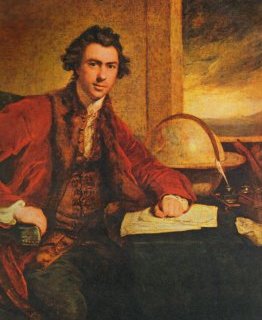
The word “Frontier” lives a double-life. In the public world of bookstores and Star Trek episodes, it carries itself with bearing, symbolizing something wild and lawless, a place of promise, adventure, and renewal. Within the Academy, however, “frontier” carries the whiff of the disreputable, a word that has fallen into disuse. Once praised and powerful, it now stoops on stair-landings to rest.
The decline of the “frontier” within the Academy has been long and precipitous. Made famous by Frederick Jackson Turner’s 1893 essay “The Significance of the Frontier in American History,” it’s been the inspiration of dozens of books and hundreds of articles.

Frederick Jackson Turner
Why? Because Turner linked the frontier to the story of American progress, arguing that it rejuvenated American culture by placing pioneers into contact with the wild, savage world at the edges of civilization. In the process, pioneers had to break from the strictures of the civilization they left behind and re-imagine life from the ground up. In the process, Turner argued, they recapitulated the long arc of human society from savagery to civilization, infusing American society with the energy of their innovations.

American Progress, John Gast, 1872
The frontier thesis was (and in some quarters, still is) seen as a compelling story of American uniqueness. In it, supporters found a story to justify a view of Americans as a special, exceptional people.
Still, the frontier thesis found itself under attack from many quarters. In the 1980s, New Western Historians argued that the frontier thesis did not accurately present the progression of changes in the West, nor did it explain the broader arc of American progress. Moreover, frontier was a word that privileged one perspective in the story of the West: the pioneers who viewed these lands as wild and savage rather than the indigenous peoples who called them home.
Between those supporting the thesis and those criticizing it, discussion of the Frontier Thesis seemed to be everywhere, a subject so fecund that it threatened to overwhelm all other subjects within the discipline. All of this ultimately led historian Patricia Limerick to label “frontier” as the F-Word, a term that had become a hindrance, rather than a help, to historian scholarship.

Patricia Limerick
What to do? In her 1992 book Imperial Eyes, Mary Louise Pratt abandoned the term frontier, replacing it instead with the phrase “contact zone,” a less loaded term for the place of encounters between indigenous peoples and Euro-Americans.
I see the wisdom in Limerick and Pratt’s decisions. And yet still, I think there’s still a place for frontier, particularly within the field of the history of exploration. Limerick is right to argue that frontier is a loaded term, one that brings with it a particular tilt. It shares this ground with other loaded terms such as “discovery” and “exploration,” concepts which only make sense from the perspective travelers rather than natives.

Joseph Banks
Yet by definition, stories of exploration adopt the perspective of people traveling into the field. For expeditionary scientists — such as Alexander von Humboldt, Joseph Banks, Charles Darwin, and Alfred Russell Wallace — the grand stage of global travel did represent frontiers, places of profound mystery, inspiration, and otherness.
That their perspective represented a limited frame of reference is clear. Still, within this frame of reference, we see powerful transformations of thought and identity. Expeditionary letters and field sketches express the weight of these events, the frontiers of new experience.












“Frontier,” despite our presentist perspective of looking back and judging what actions may or may not have been right or wrong, still carried a meaning for those who ventured into new territories, whether persons seeking new lives out west or scientists seeking new knowledge. So, wouldn’t the use of the term “frontier” still be appropriate in historical scholarship?